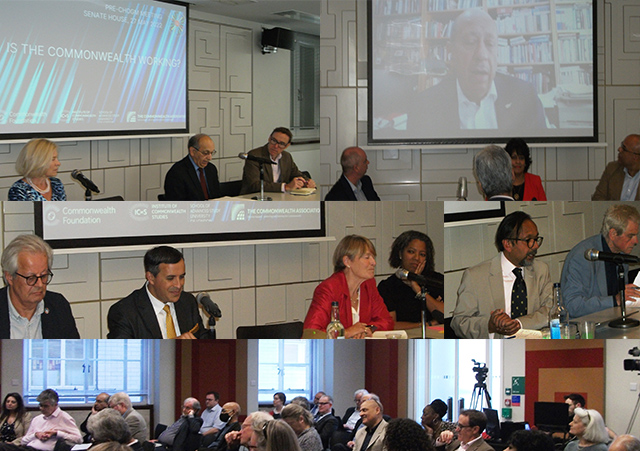 Top left clockwise: The four sessions with live and virtual panellists. Bottom: Part of the audience at Senate House. [Montage by Debbie Ransome]
Top left clockwise: The four sessions with live and virtual panellists. Bottom: Part of the audience at Senate House. [Montage by Debbie Ransome]
The twice-postponed Kigali Commonwealth summit is now due to take place in the week beginning 20 June 2022. The leaders’ debate is likely to be lively. Can the significant decline in resources be reversed and new relevance and impact be restored to the Commonwealth’s programmes? With a hotly-contested election for the post of Secretary-General under way, a controversial Chair-in-Office, and Prince Charles assuming a greater role in representing the Head, will the Commonwealth have the leadership necessary for future challenges? With recurrent questions about Rwanda’s commitment to human rights and controversy about how Commonwealth nations should treat refugees and migrants, is the association doing enough to maintain its values? And can the Commonwealth’s networks sustain it as a relevant soft power organisation for the twenty-first century, given the current turbulence in international relations following Russia’s invasion of Ukraine?
Is the Commonwealth working? This was the theme of a pre-CHOGM [Commonwealth Heads of Government Meeting] discussion held on 27 May at the Institute of Commonwealth Studies, University of London.
This event, which included in-person and virtual panellists and audiences, was organised by The Round Table: The Commonwealth Journal of International Affairs and the Institute of Commonwealth Studies, in partnership with the Commonwealth Foundation and the Commonwealth Association.
In her introduction at Senate House, University of London Vice Chancellor, Prof Wendy Thomson said that the role of international organisations was very much in the public eye today. She added that the job of such organisations has never been more difficult. “The Commonwealth, with its history and its membership, has a very important role to play,” Professor Thomson said.
The sessions focused on Networks, Leadership, Values and Programmes and included speakers from across the Commonwealth.
SESSION 1: Networks
Project Director at the Global Leadership Foundation and career diplomat, Amitav Banerji, chaired the first session. Panellists were: Commonwealth Foundation Director-General, Anne Gallagher, economist, diplomat and former Governor of the Central Bank of Sri Lanka, Indrajit Coomaraswamy, and Jon Davies of the Commonwealth Parliamentary Association UK.
Mr Banerji opened the session by pointing out that the Commonwealth was still flourishing even though many of its members had felt ‘the sharp edge of the colonial yoke’. One of the reasons it had managed to survive was that it was not just a network of member governments but a network of networks and of peoples.
Dr Gallagher spoke of the “strength and complexity” of the Commonwealth. She said that it was up to international organisations to create agency explicitly for civil society networks. In the Commonwealth, these civil society networks were “strong and flourishing … a tapestry of personal and institutional connections.” But too much of the networking and thinking was in London, and among ‘the old guard’ – it was “not sufficiently representative.” She also said there had been a “serious erosion of fundamental values” and the pandemic had exposed the Commonwealth as “failing to secure equal access to vaccines.”
CPA’s Jon Davies said that strengthening parliaments, by enabling them to learn from others, was a vital part of a healthier democracy. The Commonwealth Parliamentary Association (which included provincial parliaments and assemblies as well as national ones) provided a means of disseminating and sharing experience and best practice, and a “safe” Commonwealth space to tackle issues which might be difficult locally.
Dr Coomaraswamy said that “if the Commonwealth is to remain relevant, if must have strong developmental activity.” It was in the interests of the political pillar of Commonwealth programmes, that there should also be “well-designed and well-resourced development work”: “You cannot eat human rights.” He spelt out some key economic priorities including adapting to climate change, addressing the debt burden, promoting freer trade by breaking the Doha impasse, improving global supply chains, safeguarding food and energy security, and connecting an increasingly regionalised world. These were matters on which the Commonwealth could and should be taking a lead.
Panellists and audience contributors suggested using the 2023 tenth anniversary of the Commonwealth Charter to revise the work of the Eminent Persons Group and devise a more consistent reporting mechanism for monitoring democracy between elections.
View the opening and session one on Networks
[Filming and video by David Aitken-Smith and Melissa Aitken-Smith.
Text and photos by Debbie Ransome.]
You can read the contributed written presentations by Amitav Banerji and Anne Gallagher
View session two on Leadership
View session three on Values
View session four on Programmes
Related articles:
Rwanda and CHOGM 2020 – Round Table Journal
CHOGM diary 2010 – Round Table Journal
CHOGM diary Sri Lanka – Round Table Journal 2014
CHOGM 2008: Notes from a CHOGM novice – Round Table Journal



